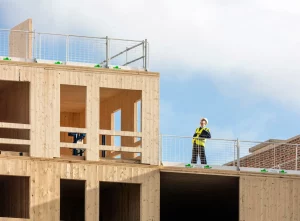As the events industry expands, so does its environmental impact. Understanding sustainable building materials in event planning is crucial for reducing waste and energy use, promoting social responsibility, and raising environmental awareness. By embracing eco-friendly practices, event organizers can positively influence the environment, boost their finances, and enhance their brand image. But what exactly are sustainable building materials, and how can they best be incorporated into event planning to maximize their benefits?
Key Takeaways
- Incorporating sustainable building materials reduces the environmental footprint of events and contributes to a more eco-conscious future.
- Sustainable practices lead to cost savings for event organizers, enhancing the overall event experience and promoting social responsibility.
- Using eco-friendly materials fosters a positive brand image, increases attendee satisfaction, and creates memorable and community-focused events.
- Sustainable building materials like recycled metal, reclaimed wood, and low-VOC paints inspire wonder and connection among attendees, promoting a sense of community.
- Adopting sustainable practices in event planning paves the way for a more environmentally friendly and responsible industry, enhancing the event’s reputation and appeal.
The Importance of Eco-Friendly Events
Today, more than ever, the importance of hosting eco-friendly events cannot be overstated, as the event planning industry is increasingly recognizing its noteworthy environmental footprint. By adopting sustainable practices, event organizers can notably reduce waste, conserve resources, and promote a culture of environmental responsibility. This shift towards eco-friendliness not only benefits the planet but also enhances the event’s reputation and appeals to the growing demographic of environmentally conscious attendees.
What Are Sustainable Building Materials
Several eco-friendly alternatives to traditional building materials are emerging, offering event planners a range of sustainable options for constructing event infrastructure, from recycled metal and reclaimed wood to low-carbon concrete and bamboo. Understanding sustainable building materials is essential in event planning, as it allows for the creation of eco-friendly events that minimize environmental harm.
Environmental Impact of Events
Approximately 35% of greenhouse gas emissions are attributed to the events industry, making it a significant contributor to climate change and environmental degradation. The production and disposal of traditional building materials used in event planning exacerbate this issue. Understanding sustainable building materials is essential in mitigating the environmental impact of events, paving the way for a more eco-friendly future.
Benefits of Sustainable Practices

By incorporating sustainable building materials into event planning, organizers can greatly reduce their environmental footprint while also reaping numerous benefits that enhance the overall event experience. This understanding of sustainable building materials fosters a positive brand image, increases attendee satisfaction, and even leads to cost savings. By adopting sustainable practices, event planners can create memorable events that not only delight attendees but also promote a sense of community and social responsibility.
Sustainable Materials in Action
In the pursuit of eco-friendly events, innovative sustainable building materials are being utilized to create immersive and engaging experiences that not only reduce waste but also inspire a sense of wonder and connection among attendees. Understanding sustainable building materials, event planners are incorporating repurposed wood, recycled metals, and low-VOC paints to craft unique spaces that foster community and minimize environmental impact.
Frequently Asked Questions
How Do Sustainable Building Materials Impact the Overall Event Budget?
When incorporating sustainable building materials into event planning, the initial investment may be higher, but long-term cost savings arise from reduced waste, energy efficiency, and potential tax incentives, ultimately offsetting the overall event budget.
Can Sustainable Materials Be Used for Temporary Event Structures?
Yes, sustainable materials can be used for temporary event structures, offering a guilt-free alternative to traditional materials, while reducing waste and minimizing environmental footprint, and fostering a sense of community among eco-conscious attendees.
Are There Any Certifications for Understanding Sustainable Building Materials in Events?
Yes, certifications like ISO 20121 and BS 8901 provide a framework for understanding sustainable building materials in events, ensuring environmentally responsible practices and minimizing the industry’s ecological footprint.
Do Sustainable Building Materials Compromise on Aesthetic Appeal?
Not necessarily; sustainable building materials can be just as visually stunning as traditional options, with many companies now offering stylish, eco-friendly alternatives that prioritise aesthetics alongside environmental responsibility.
Can Event Planners Claim Carbon Credits for Using Sustainable Materials?
Yes, event planners can claim carbon credits for using sustainable materials, as certified by organizations like the International Carbon Reduction and Offset Alliance, providing a tangible incentive for environmentally responsible event planning practices.
Conclusion
Finally, integrating sustainable building materials into event planning is essential for minimizing environmental impact and promoting social responsibility. By embracing eco-friendly practices, event organizers can decrease waste, energy consumption, and greenhouse gas emissions, ultimately contributing to a healthier planet. This forward-thinking strategy not only benefits the environment but also results in cost savings, improves the event experience, and builds a positive brand image. As the event industry progresses, sustainable building materials will play a significant role in shaping a more environmentally conscious future.

